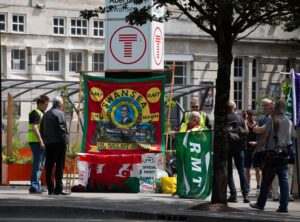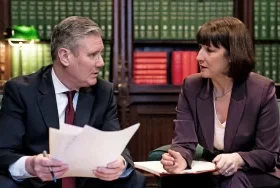The train drivers’ union Aslef has announced another week of summer industrial action as its members started a third week-long national overtime ban in England on Monday morning, spelling more disruption for passengers.
Aslef said there would be a further overtime ban from Monday 31 July to Friday 5 August, in the long-running pay dispute, as unions revealed that almost three months had passed without talks with industry bosses – and six months without any contact with government.
The announcement was made as a week of overtime bans got under way. A number of train operators have slashed schedules because of not having enough rostered drivers to run a full service. Strikes later in the week by the RMT are expected to cause significant disruption.
Passengers have been urged to check before they travel, with South Western, Chiltern, Greater Anglia and TransPennine Express among operators that have cut timetables in advance. Great Western and all of Govia Thameslink Railway’s trains – Southern, Thameslink, Great Northern and Gatwick Express – are also affected.
Train staff in the RMT union are also poised to strike across England-based train operators contracted to the Department for Transport (DfT), with 24-hour stoppages on Thursday and Saturday this week.
The Rail Delivery Group, which represents train operators, said the RMT strikes and Aslef overtime ban would “undoubtedly cause some disruption, affecting not only the daily commute of our passengers but also disrupting the plans of families during the summer holidays”.
A spokesperson added: “While we are doing all we can to keep trains running, unfortunately there will be reduced services between Monday 17 July and Saturday 29 July, so our advice is to check before you travel.”
The Aslef general secretary, Mick Whelan, said: ‘We don’t want to take this action. We don’t want people to be inconvenienced. But the blame lies with the train companies, and the government which stands behind them, which refuse to sit down and talk to us and have not made a fair and sensible pay offer to train drivers who have not had one for four years – since 2019 – while prices have soared in that time by more than 12%.”
He said the 4% offer made in April was designed not to be accepted, adding: “We have not heard a word from the employers since then … and we haven’t sat down with the government since Friday 6 January. That shows how little the companies and the government care about passengers and staff.”
Whelan said the union wanted a fair resolution and was “taking this action, to try to bring things to a head”.
On Sunday, the RMT leader, Mick Lynch, also blamed the rail industry and government for refusing to try to settle the dispute. He said: “We’re available to talk to them, but I don’t think I’ve met a government minister since January, and even the employers now have stopped negotiating.”
A DfT spokesperson said the government had “played its part by facilitating fair and reasonable pay offers”, adding: “Union leaders should stop blocking their members from having a vote on these offers and give them the chance to help resolve this dispute.”
Read more:
Train drivers’ union Aslef announces more industrial action as strikes loom








